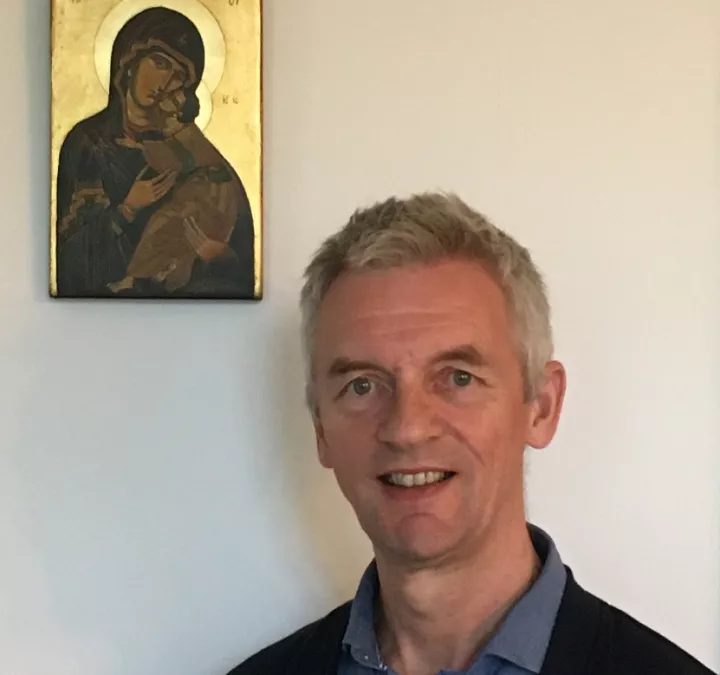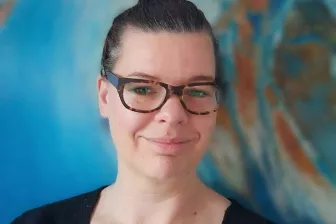Theunis Veenstra has been a preacher in the Veenhuizen prison complex for five years. Initially for the Norwegian convicts that were kept in Norgerhaven at the time. Since two years also in Esserheem. He first heard about restorative mediation when he was a village preacher. “I realized that you can have a very nice role in that, as a spiritual caregiver.”
“When I was still a village preacher, I was approached by people who were involved in a traffic accident. They wanted to get in contact with the person who caused the accident. Because I knew both parties and wanted to make sure there would be no conflict of interest, I proposed to ask for the help of Perspectief. I already knew it back then: it’s so good that this exists, because there’s the aspect of the mediation ánd of the guidance. Even if there wouldn’t be an actual mediation, I could listen to all of the people involved without taking a side. That was a nice idea for me. The mediation ended up going very well, I stayed in contact with both parties. That was my first experience with Perspectief, and I realized that you can have a very nice role in that, as a spiritual caregiver.”
Poetry bundle
The second time I got in contact with Perspectief when I started working for the judicial system. I found the poetry bundle ‘Words of recovery’, that was made for the occasion of the recovery relay involving several different prisons. This bundle meant a lot to me, because as a prison preacher that was just getting started, it allowed me to look into the souls of the people I was working with. It was the language of the convicts themselves, and I could use that in my services as well. Not as a trick from the outside, but as something from us in here, words of someone who is in prison. ‘What is being said here? What was written here?’ It was very relatable to the men.”
Shame
By now, Theunis has experienced a mediation from up close, in which he worked closely together with the mediator from Perspectief. How did he identify the needs of the convict? “What I saw was a convict who remained inside the church hall after a service in such a way that I started talking to him, and I realized immediately: something’s going on here. There was immediately a feeling of shame for him. And that shame mainly applied to himself. He said: ‘Theunis (because some people call me by my first name), in a crazy moment of drunkenness, bravado and the game, something happened. I really scared myself.’”
Religious perspective
“After many conversations, I told him: ‘How can you move on from this? This shame you feel towards yourself, from a religious perspective towards God, would you like to also express it towards the person who this is about?’ and he said: ‘Very much.’ I explained that there’s an organization that does this in a professional way, in which they listen to you and to your victim. After an informative conversation you can see whether this is something for you. And much the same way, the victim will also have to consider this. He had made up his mind very quickly, and we quickly got in contact with the mediator.”
Multidisciplinary
“Early on, I told the case manager that I was working on this. I think they should hear about these kinds of things from us spiritual caregivers, because I very much believe in a multidisciplinary way of working. I realized then that mediation had already been mentioned during the course ‘Choosing for Change’. In this prison we have a re-integration worker that has registered multiple people for restorative mediation this year. But not everyone is able to already understand during this course what it means to reflect on your own crime this way.”
“If you mention mediation at the beginning, you have to mention it again later on”
“This convict was still too focused on his own shame at that time. That’s why I believe so much in multidisciplinary working: after they get out of this course, how do we keep them in the picture? If you mention mediation at the beginning, you have to mention it again later on. We can do that as well, as spiritual caregivers. Everyone needs to take responsibility for this.”
Confidentiality
“The confidentiality you have as a spiritual caregiver is a treasure we keep. That is our gold. I also vehemently believe in contract-thinking. If you discuss it with the convict like: ‘Many people here take care of you, is it okay for you if I tell the case manager that you applied for restorative mediation? If you don’t want me to, I won’t do it, but it would be good to do it. And that’s not about the content of the mediation.’ He said it was no problem. And at the end, this man moved abroad in the meantime, I informed the case manager that he had gotten closure here.”
Letter
During the mediation it was decided that the offender would write a letter to the victim. “He wrote a beautiful letter, in which he wanted to show the victim that he also struggled with what happened. He did this with words in which his victim would read that he felt like a victim too. This is not what he meant, and the mediator made him aware of this. She told him: ‘Leave it out of the letter, but you can show this feeling to Theunis.’ I immediately thought: this is how it should be. I told the offender: ‘What you wrote in the first version of the letter, I will take that on. We will discuss it together.’ And he understood that very well.”
Tip
“Work in a multidisciplinary way. Don’t stay in your chair as a spiritual caregiver thinking: I know best. The same goes for people with other functions. And discuss it with each other. That’s also very important for the aftercare. After someone did a mediation, that doesn’t mean it’s done. As a spiritual caregiver you can continue to talk to these people for years after. It’s important that you tell them: it takes courage to reflect on your crime, what really happened? Forgiveness can’t go without reconciliation, but from our background we are also called to say: it can’t be cheap grace. Something really needs to happen. And we tell those men this. I often hear: ‘I am forgiven.’ Then I tell them: ‘Okay, you are accepted the way you are, now we move further. Why are you forgiven? And then you end up talking about the victim. We consciously mention this, in a way that is safe, but that can also be confronting.”

